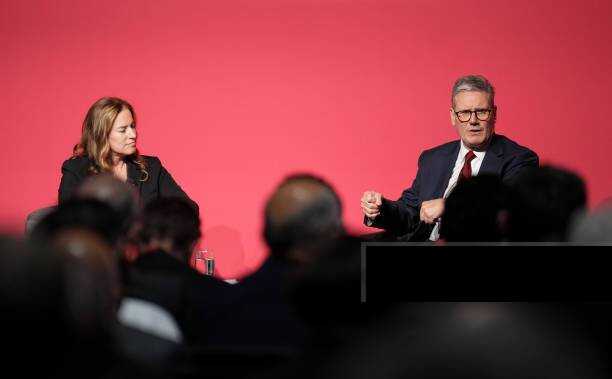Big banks, oil companies, and tech firms lobby at Labour’s business day event

More than 500 lobbyists and executives flock to access ministers at party’s biggest ever business event at conference
Big banks, oil companies and tech firms were among the more than 500 lobbyists and executives who flocked to Labour’s biggest ever business event at its conference, paying £3,000 a ticket for the chance to gain access to ministers.
Keir Starmer was introduced by the chief executive of HSBC and interviewed by the UK chief of Google, and told businesses they should come directly to No 10 if they had any problems being heard by the government.
The £3,000-a-head “business day” was sponsored by firms including Heathrow airport, which in July said it would put forward a new blueprint pushing for expansion, and HSBC, whose analysts recently claimed that Labour’s plans to bring in a genuine living wage would risk harming the economy.
The event was more transparent than in previous years and those at the Conservative party conference, with delegates given the chance to question Reeves, Starmer and Jonathan Reynolds, the business secretary, in hour-long sessions in front of an audience.
Starmer was introduced by Ian Stuart, the HSBC chief, who said there was optimism among companies about a reset in relations with the EU and praised Labour for pursuing a “genuine partnership with business”.
The prime minister then told Debbie Weinstein, Google’s UK chief, that he was inviting business to “partner with us”, acknowledging there was some frustration about not being heard.
However, the mood among many of the lobbyists and business representatives appeared to be anxious over tax changes and the prospect of the government’s new workers’ rights bills, which will bring in day one rights for employees and an end to exploitative zero-hours contracts.
One delegate expressed disappointment that there were “no roundtables where you get the chance to raise things with ministers” – unlike at the Conservative conference – and that businesses were finding it difficult to secure meetings with ministers.
“We don’t really have the feeling that we are being listened to and there isn’t much of a chance for one-on-one chats with ministers,” one business representative said.
Another lobbyist said: “They talk a good game about being pro-business but we are all nervous about what we are going to see in the budget and what the workers’ rights package will end up looking like. That’s what we are all talking about here.”
Delegates were also grumbling about the “stale sandwich” buffet lunch and lack of top-tier cabinet ministers in attendance at the “networking” section of the event.
The event has doubled in size from last year, when Labour was in opposition, and it raised the cost for attendance by almost 50% to £3,000 a seat.
There were more than 100 executives in attendance, from companies including Uber, the private equity firm Blackstone and the oil companies ExxonMobil and Shell, as well as the banks Citi Group and JP Morgan Europe.
Many of the questions from the floor pressed for more details on the government’s planned industrial strategy, its approach to taxation and how it would implement its package on workers’ rights.
On employment rights, Reeves struck an emollient tone as she said she hoped businesses would be happy with the compromises made. She said it was necessary “to make sure our labour market treats working people with respect” in relation to zero-hours contracts and sick pay.
She added: “I hope you will have seen this, over the last 80 days we have been in office, we have worked really closely with the business sector … We will be publishing more details in the next couple of weeks but I hope that you see your concerns have been addressed and understood because we don’t want to do anything that makes it harder for you to take a risk and employ someone.”
Some business leaders expressed frustration at the pace of change the government was applying to certain decisions, including on its plans for a modern industrial strategy.
Reeves announced in her conference speech that the plan, which will outline the government’s priorities for particular sectors of the economy, would be unveiled next month.
However, attenders at the business event said it was still unclear who would lead the government’s industrial strategy council, a body that will be set up to oversee the policy, and grumbled that an investment minister had yet to be appointed to work with business.
“We asked for it as quickly as possible but we still don’t know what it is, or who is leading it,” said one senior industry representative.
Others said they expected to learn little from the event before the chancellor’s budget next month. “We didn’t get anything new, did we?” said a representative of one leading industrial company.
Some also commented on relatively thin early attendance levels at the event, until fireside chats with the chancellor and prime minister at the end of the day, before a packed-out drinks reception sponsored by the financial data company Bloomberg.
Read more similar news:
Comments:
comments powered by Disqus

































